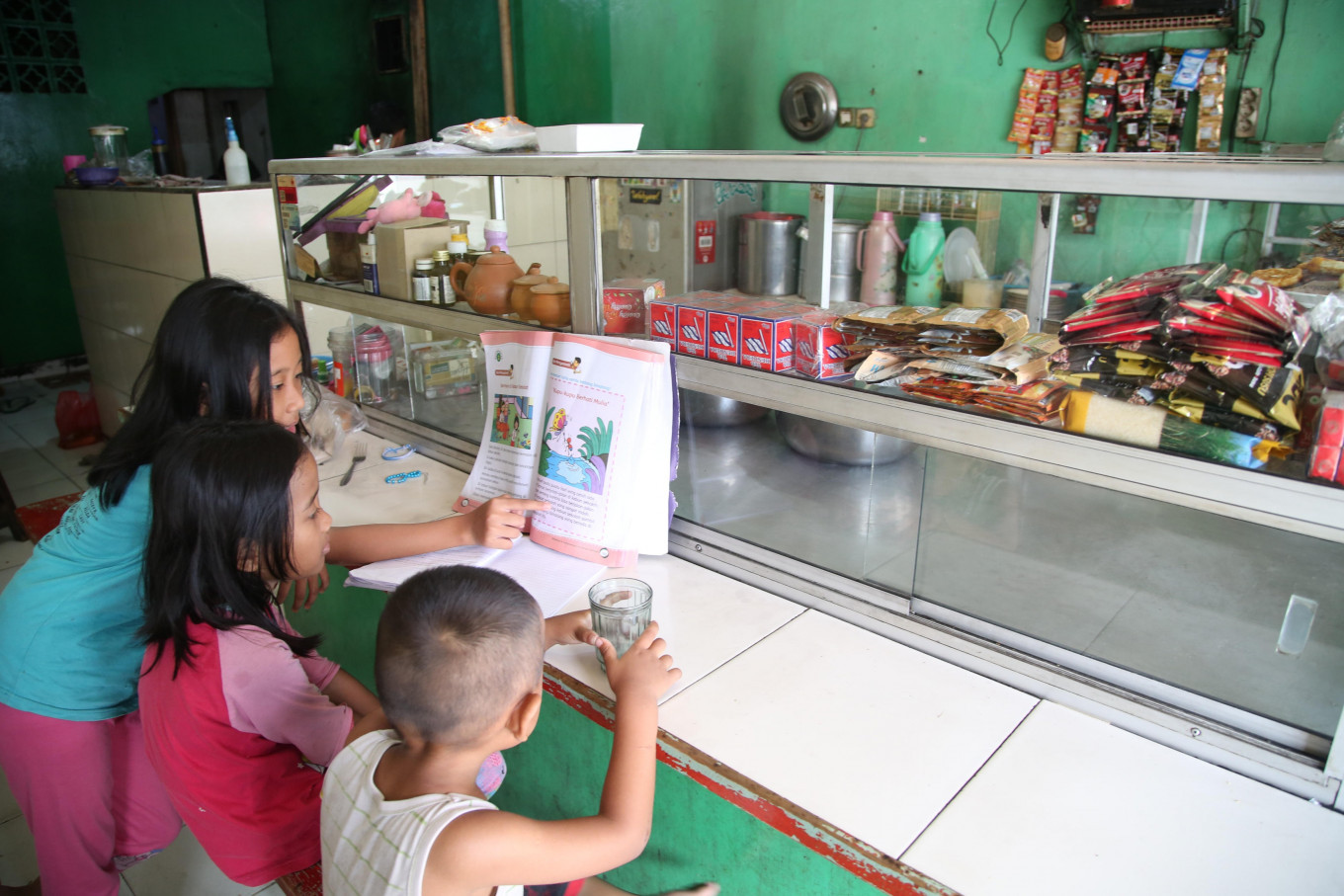Popular Reads
Top Results
Can't find what you're looking for?
View all search resultsPopular Reads
Top Results
Can't find what you're looking for?
View all search resultsPak Nadiem, please send the kids back to school
Another compelling reason for returning to offline schooling is that, given the digital divide, online schooling is not an option for children from poor families.
Change text size
Gift Premium Articles
to Anyone
 Study wherever: Mesa (left), a fifth grader, helps her younger sister Shafa (center) study for school at the customers table of their parent’s food stall in Pinang Ranti, East Jakarta, on April 3, while their 4-year-old brother Eland looks on. The spread of COVID-19 virus has forced millions Indonesians, including schoolchildren, to work and study from home. (JP/P.J.Leo)
Study wherever: Mesa (left), a fifth grader, helps her younger sister Shafa (center) study for school at the customers table of their parent’s food stall in Pinang Ranti, East Jakarta, on April 3, while their 4-year-old brother Eland looks on. The spread of COVID-19 virus has forced millions Indonesians, including schoolchildren, to work and study from home. (JP/P.J.Leo)
T
his article should have been written weeks ago, before the government decided not to reopen most schools and before the academic year began this month.
But it may not be too late to ask Education and Culture Minister Nadiem Makarim to reconsider his policy, which, like many other government decisions made during the pandemic, was made without the benefit of a thorough public debate.
Almost everyone – parents, teachers, educators and lawmakers – were convinced that the policy of keeping schools closed was the best and only viable course to keep children safe from COVID-19 infection. There seemed to be nothing to debate. Period.
Contrast this with the heated arguments the nation has had about reopening offices, markets and shopping malls. Going back to work so that people have the chance to earn a living is certainly important, but isn’t the education of our children just as important? This is probably one of those times that we should ask children for their opinion.
The debate that is currently raging in other countries over reopening schools, including in the United States, should give us pause to reconsider our own policy because some of the points raised in these debates are valid.
We were all mesmerized when schools moved online in March as the pandemic began to make its way into Indonesia. Children, being digital natives, quickly turned to their gadgets to attend classes and complete the school year in June. What would we do without the internet?
The novelty, however, soon wore off. Online classes are a poor substitute for real schools, with real classes, real teachers and real friends.
What is real education? If education only means the attainment of academic excellence, online classes will suffice for children to learn mathematics and science. But if education, especially for young children during their formative years, also means developing values and moral character, learning social discipline and social skills, then we need to reconsider our decision to keep children out of school.
Before the pandemic, many parents were struggling to restrict the time children spent using digital gadgets. With online schooling, it has become harder to tell if kids are playing or studying.
Gadget addiction, already a huge problem, is about to get worse. More children will grow up as loners, exhibiting asocial behavior, and the consequences of this will only be known 10 or 20 years from now.
Women’s Empowerment and Child Protection Minister I Gusti Ayu Bintang Darmawati has acknowledged, as reported by Kompas, that children will be psychologically burdened if they stay at home for too long, without going to school, playing outdoors or seeing friends.
But rather than calling for the reopening of schools, she said parents should help kids navigate this difficult period.
Unfortunately, not all parents are good at homeschooling. In typical urban families, where both parents work, this is even more difficult.
Minister Nadiem and those who support the policy to keep schools closed no doubt have the health and safety of children in mind. We all do. Sending them back to school would put them at greater risk of infection, and when they return home, they’d put their families at risk.
But isn’t this argument equally applicable to adults returning to in-person work? Who’s to say that children are less likely to follow COVID-19 health protocols? They learn and adapt much faster to these protocols at home and at school.
Another compelling reason for returning to offline schooling is that, given the digital divide, online schooling is not an option for children from poor families. A new study by the SMERU Research Institute found that many children had difficulty accessing the internet. These kids will fall behind others, further exacerbating the rich-poor gap that is already being widened by COVID-19.
Typically, the response to the SMERU report is to call for infrastructure improvement to make the internet more broadly accessible. No one has been talking about reopening schools.
For a democratic nation like Indonesia, it is frustrating that we did not have a public debate on the pros and cons of reopening schools. Major policies, especially those affecting children – our future – should be discussed thoroughly. We have not heard enough of the opposing views that have been raised in other countries having this debate.
If we had the debate, perhaps we would come to the same conclusion that The Economist did regarding the United States – that the risk of closing schools outweighs the benefits.
As we commemorate National Children’s Day today, can we at least reconsider?
-------
The writer is a journalist with three grandchildren, two of whom are in school.









